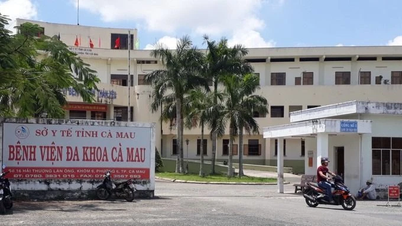This is the second case performed by the two hospital teams, just 7 days after the first successful fetal interventional catheterization in Vietnam.
On the morning of January 12, the team from Tu Du Hospital and Children's Hospital 1 successfully intervened in a case of a fetus with a very severe congenital heart disease, aortic valve stenosis, hypoplastic left ventricle with a high risk of death immediately after birth. This is the second case that the team from the two hospitals performed, just 7 days after the first successful fetal intervention in Vietnam.
The patient is a pregnant woman NPPA (27 years old, living in District 3) whose fetus was found to have a heart abnormality at 21 weeks of pregnancy with a diagnosis of progressive aortic valve stenosis. By January 11, 2023, the fetus was 29 weeks old with severe aortic valve stenosis progression, valve diameter 2.6 mm, blood velocity through the aortic valve 300cm/s, causing more severe left ventricular hypoplasia, and severe mitral regurgitation.
Through consultation, fetal and pediatric cardiology experts all determined that if this case does not have urgent fetal intervention or late intervention after 30 weeks of gestation to dilate the aortic valve, there is a very high possibility that the fetus will be lost in the womb (stillbirth rate > 50%) or the fetus will progress to hypoplastic left ventricle syndrome and 1-ventricular heart wall (after birth, the child must undergo multi-stage surgery to temporarily return to 1-ventricular circulation or must be completely treated with a heart transplant).

Cardiologists agree that fetal cardiology intervention at this time is appropriate, however, it is predicted that the fetal position will not be favorable for cardiac intervention because of excess amniotic fluid, the fetus changes position continuously, the fetal position changes a lot, so it will be difficult to perform the procedure, the procedure may not be successful, and it is necessary to explain the risk of fetal heart loss during the intervention.
At exactly 9:15 a.m. on January 12, 2024, the fetal intervention and pediatric interventional cardiology team of Tu Du and Children's Hospital 1 began performing transuterine interventional cardiology for the pregnant woman. The pregnant woman was given spinal anesthesia, then an ultrasound was performed to re-check the position of the fetus.
Due to the unfavorable fetal position, the left ventricle is prone in the prone fetal position, so the fetal intervention surgery team must use tools and techniques to turn the fetus to the most appropriate position, which is the fetus lying on its back, the heart chamber is in direct contact with the anterior wall of the uterus. This technique takes more than 40 minutes to achieve the expected results. Then, the drug is injected into the fetal thigh to induce anesthesia.
When the needle was inserted into the left ventricle, the left ventricle was found to be small and thick due to ventricular hypoplasia. The intervention team of Tu Du Hospital encountered many difficulties and took a long time (20 minutes) to insert the needle into the correct position, then transferred it to the heart valve team of Children's Hospital 1 to perform the final important step of dilating the aortic valve. After dilation, the flow through the ascending aortic valve was checked to be good.
At 11 o'clock, the surgery ended and was a great success. The leaders of the Ho Chi Minh City Department of Health directly came to shake hands and congratulate each member of the intervention team of Tu Du Hospital and Children's Hospital 1 on this special case. The pregnant woman was closely monitored after the surgery. By 1:00 p.m. on January 12, the fetal pericardial effusion was well controlled, the fetal heart rate was normal, and the mother's condition was stable.
THANH SON
Source


![[Photo] General Secretary concludes visit to Azerbaijan, departs for visit to Russian Federation](https://vphoto.vietnam.vn/thumb/1200x675/vietnam/resource/IMAGE/2025/5/8/7a135ad280314b66917ad278ce0e26fa)
![[Photo] Prime Minister Pham Minh Chinh meets with the Policy Advisory Council on Private Economic Development](https://vphoto.vietnam.vn/thumb/1200x675/vietnam/resource/IMAGE/2025/5/8/387da60b85cc489ab2aed8442fc3b14a)
![[Photo] National Assembly Chairman Tran Thanh Man chairs the meeting of the Subcommittee on Documents of the First National Assembly Party Congress](https://vphoto.vietnam.vn/thumb/1200x675/vietnam/resource/IMAGE/2025/5/8/72b19a73d94a4affab411fd8c87f4f8d)
![[Photo] General Secretary To Lam begins official visit to Russia and attends the 80th Anniversary of Victory over Fascism](https://vphoto.vietnam.vn/thumb/1200x675/vietnam/resource/IMAGE/2025/5/8/5d2566d7f67d4a1e9b88bc677831ec9d)
![[Photo] President Luong Cuong presents the decision to appoint Deputy Head of the Office of the President](https://vphoto.vietnam.vn/thumb/1200x675/vietnam/resource/IMAGE/2025/5/8/501f8ee192f3476ab9f7579c57b423ad)

























































![[Photo] Prime Minister Pham Minh Chinh talks on the phone with Singaporean Prime Minister Lawrence Wong](https://vphoto.vietnam.vn/thumb/402x226/vietnam/resource/IMAGE/2025/5/8/e2eab082d9bc4fc4a360b28fa0ab94de)






























Comment (0)